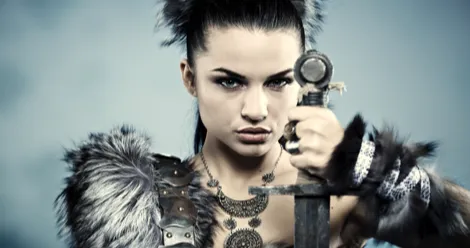
Choose a Better Chosen One
This content contains affiliate links. When you buy through these links, we may earn an affiliate commission.
I’ve been watching the series Into the Badlands lately (no, keep going, I promise this becomes book-related) and there’s one character in it that I hate with a loathing that can only be described as incandescent: MK. I think the best summation of my issues with MK is that he’s got chosen-one-itis really bad despite that he hasn’t actually been called a Chosen One, in that everyone likes him despite his utter lack of all redeeming qualities.
To make certain that we’re all on the same page here, the “Chosen One” is a character trope that means this particular character has been chosen by some force–be it a god or a prophecy or sometimes even sheer dumb luck–to be the only person in the story capable of resolving the plot. Normally, this is because they have some special, remarkable power that no one else has. It’s a staple of the fantasy genre particularly, but you see it in science fiction and non-specfic too, if cleverly disguised. And there’s a lot that’s problematic with this trope, which Aliette de Bodard wrote about in a very concise and thoughtful way.
But it can also be a lot of fun and quite non-obnoxious to read about a Chosen One… when done right. Here, I’ve got some literary examples — and none of them are Harry Potter or Neville Longbottom.
Tamír/Tobin – The protagonist of Lynn Flewelling’s “Tamir Triad,” which begins with The Bone Doll’s Twin. Tamír is a very literal chosen one, predicted by the Oracle to be destined to become Queen, taking the throne back from her usurper uncle and saving the kingdom of Skala in the process. Her uncle, as you might suspect, has a problem with this, which leads to Tamir being magically disguised in a male body (thus being Tobin) thanks to some wizards wielding very dark magic. Tamir has a hard path and remains believable and sympathetic, a strong and complex character in a very twisted world, shouldering an unfairly heavy burden.
Paul Atreides – There aren’t too many chosen ones in science fiction, thanks to the general lack of oracles and prophecies, but Paul Atreides in Dune (and later his son Leto II) definitely fits the bill. Paul’s the result of the long-lasting Bene Gesserit breeding program to create a messiah for the universe who can see the future and past, the Kwisatz Haderach. In fact, he gets to be the chosen one twice over, since the Fremen of Arrakis peg him as their awaited-for Mahdi. Through it all, Paul remains very human for a messiah, someone who makes very difficult choices out of a set of options that are all bad.
Melanie Tamaki – She might be human, but her parents aren’t. They’re from the limbo realm that exists half a step off ours, called Half World, which is non-coincidentally also the title of the book. Melanie is the prophesied special child who has been born to bring balance to the three realms. On its face, there’s an Anakin-esque quality to that whole “bring balance to X” prophecy, but Melanie is decided un-Anakin-like, and the book goes to some dark places with just what that kind of prophecy might mean.
Alanna the Lioness – from Tamora Pierce’s “Song of the Lioness” quartet. Alanna wants to be a knight rather than a proper lady, so she trades places with her brother Thom (who wants to be a sorcerer) and pretends to be a boy to get through training. Considering that in the second book (In the Hand of the Goddess), the Great Mother Goddess literally shows up and tells Alanna that she’s been chosen, I have no qualms about putting her on this list. Of course, being chosen by the Goddess doesn’t really do more than make Alanna’s life more difficult than it already was, by placing even higher expectations on her–and the knowledge that something big and worrying is on the horizon for the kingdom of Tortall.
Phèdre nó Delauney – from Jacqueline Carrey’s Kushiel’s Legacy series, which starts at Kushiel’s Dart. Phèdre is another god-chosen person, this time by Kushiel, the god who watches over punishment, suffering, and atonement. He’s gifted Phèdre with the rare ability to take pleasure in pain, and sets her at the center of a tangle of conspiracy and intrigue. Perhaps the thing that sets Phèdre apart in the realm of fantasy heroines is that her greatest weapons are her intellect and her ability to love — to understand. It makes her a talented spy, and she tends to get herself into and out of trouble with her wits and her social skills.








